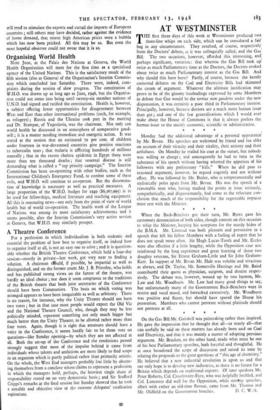Organising World Health
Next June, at the Palais des Nations at Geneva, the World Health Organisation will meet for the first time as a specialised agency of the United Nations. This is the satisfactory result of the fifth session (also at Geneva) of the Organisation's Interim Commis- sion which concluded last Saturday. There were, indeed, com- plaints during the session of slow progress. The constitution of W.H.O. was drawn up as long ago as June, 1946, but the Organisa- tion could not come into being until twenty-six member nations of U.N.O. had signed and ratified the constitution. Health is, however, a subject offering fewer opportunities for disagreement between West and East than other international problems (such, for example, as refugees) ; Russia and the Ukraine took part in the meeting and Dr. Stampar, of Yugoslavia, was the chairman. Not only can world health be discussed in an atmosphere of comparative good- will ; it is a matter needing immediate and energetic action. It was stated at the session that an estimated 70 per cent. Of children under fourteen in war-devastated countries give positive reactions to tuberculin tests ; that malaria is afflicting hundreds of millions annually ; that in the recent cholera epidemic in Egypt there were more than ten thousand deaths ; that venereal disease is still demanding what is called a "top priority campaign." The Interim Commission has been co-operating with other bodies, such as the International Children's Emergency Fund, to combat some of these evils, and W.H.O. will continue to co-operate. But the dissemina- tion of knowledge is necessary as well as practical measures. A large proportion of the W.H.O. budget for 1949 ($6,367,995) is to be used for fellowships, medical literature and teaching equipment. All this is reassuring news—not only from the point of view of world health but of world co-operation. The health work of the League of Nations was among its most satisfactory achievements and it seems possible, after the Interim Commission's very active session at Geneva, that W.H.O. may similarly prosper.


































 Previous page
Previous page